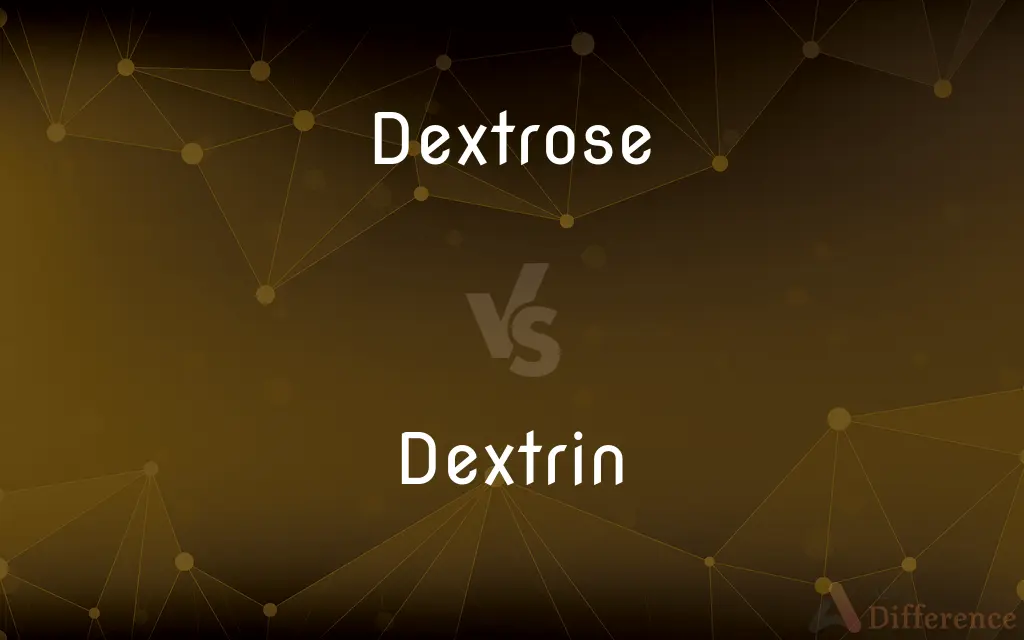Dextrose vs. Dextrin — What's the Difference?
By Tayyaba Rehman — Updated on November 7, 2023
Dextrose is a simple sugar chemically identical to glucose, while dextrin is a complex carbohydrate composed of glucose molecules linked together.

Difference Between Dextrose and Dextrin
Table of Contents
ADVERTISEMENT
Key Differences
Dextrose, commonly known as glucose, is a simple sugar that the body uses as a primary source of energy. It is naturally occurring in many plants and is a key player in the metabolism of cells. Dextrin, in contrast, is a group of low-molecular-weight carbohydrates produced by the hydrolysis of starch. They are not sugars themselves but are polymers made up of multiple glucose units.
While dextrose serves as a quick energy source, dextrin functions differently. Dextrins are less sweet and are not used directly by the body for energy. Instead, they can act as soluble fibers in the diet, aiding in digestive health. Dextrose can be found in sports drinks and medical IV fluids due to its fast absorption into the bloodstream, whereas dextrin is often used as a fiber supplement or to create a crisp texture in foods.
The manufacturing process of these substances also differs. Dextrose is typically isolated from starchy plants through enzymatic hydrolysis, which breaks down the starch into smaller glucose units. Dextrin is created through a controlled heat treatment of starch, leading to the partial breakdown of the starch molecules into shorter chains.
In a medical setting, dextrose is often used to treat low blood sugar or dehydration, whereas dextrin is not commonly used in medical treatments. Instead, dextrin may be found in pharmaceuticals as a binder to hold pills together or as a source of dietary fiber in nutritional products.
Lastly, while both are derived from starches, the body's response to each is distinct. Dextrose can cause a rapid spike in blood sugar levels, while dextrin's absorption is slower, potentially making it a better option for sustained energy release and for managing post-meal blood glucose levels.
ADVERTISEMENT
Comparison Chart
Type of Carbohydrate
Simple sugar (monosaccharide).
Complex carbohydrate (polysaccharide).
Role in Diet
Quick energy source.
Source of dietary fiber.
Sweetness
Sweet.
Less sweet or tasteless.
Digestion and Absorption
Rapidly absorbed into the bloodstream.
Slower digestion and absorption.
Use in Products
Sports drinks, medical solutions.
Food texture enhancer, fiber supplements.
Compare with Definitions
Dextrose
Simple Sugar
Dextrose is used in IV solutions to rapidly increase blood sugar levels.
Dextrin
Starch Breakdown Product
Dextrin is produced by heating starch to create a thickening agent.
Dextrose
Energy Source
Athletes consume dextrose for an immediate energy boost.
Dextrin
Industrial Use
Dextrin glues are strong and used in label adhesives.
Dextrose
Monosaccharide
Dextrose is a building block for many carbohydrates in nature.
Dextrin
Food Processing
Dextrin is used to give a crispy texture to processed foods.
Dextrose
Glucose
Dextrose powder can be added to food to increase sweetness.
Dextrin
Dietary Fiber
Adding dextrin to a meal can help increase fiber content.
Dextrose
Medical Use
Dextrose injections are common in emergency treatments for hypoglycemia.
Dextrin
Complex Carbohydrate
Dextrins are composed of several glucose molecules bonded together.
Dextrose
The dextrorotatory form of glucose (and the predominant naturally occurring form).
Dextrin
A translucent, gummy, amorphous substance, nearly tasteless and odorless, used as a substitute for gum, for sizing, etc., and obtained from starch by the action of heat, acids, or diastase. It is of somewhat variable composition, containing several carbohydrates which change easily to their respective varieties of sugar. It is so named from its rotating the plane of polarization to the right; - called also British gum, Alsace gum, gommelin, leiocome, etc. See Achroödextrin, and Erythrodextrin.
Dextrose
The dextrorotatory form of glucose, C6H12O6·H2O, the naturally occurring form of glucose found in all organisms. Also called dextroglucose.
Dextrin
Dextrins are a group of low-molecular-weight carbohydrates produced by the hydrolysis of starch or glycogen. Dextrins are mixtures of polymers of D-glucose units linked by α-(1→4) or α-(1→6) glycosidic bonds.
Dextrose
The naturally-occurring dextrorotatory form of glucose monosaccharide molecule.
Dextrin
A soluble gummy substance obtained by hydrolysis of starch, used as a thickening agent and in adhesives and dietary supplements.
Dextrose
A sirupy, or white crystalline, variety of sugar, C6H12O6 (so called from turning the plane of polarization to the right), occurring in many ripe fruits, and also called glucose. Dextrose and levulose are obtained by the inversion of cane sugar or sucrose, and hence the mixture is called called invert sugar. Dextrose is chiefly obtained by the action of heat and acids on starch, and hence called also starch sugar. It is also formed from starchy food by the action of the amylolytic ferments of saliva and pancreatic juice.
Dextrin
Any of various soluble polysaccharides obtained from starch by the application of heat or acids and used mainly as adhesives and thickening agents.
Dextrose
An isomer of glucose that is found in honey and sweet fruits
Dextrin
(carbohydrate) Any of a range of oligomers of glucose, intermediate in complexity between maltose and starch, produced by the enzymatic hydrolysis of starch; used commercially as adhesives.
Common Curiosities
How is dextrose made?
Dextrose is commercially produced from starch through enzymatic hydrolysis.
What is dextrose?
Dextrose is a simple sugar that is chemically identical to glucose.
Is dextrin used in food?
Yes, as a fiber supplement and to improve texture.
Does dextrose affect blood sugar?
Yes, it can cause a rapid increase in blood sugar levels.
What is dextrin?
Dextrin is a group of complex carbohydrates formed by the breakdown of starch.
Can dextrin be digested easily?
Dextrin is more slowly digested than dextrose.
Is dextrose good for athletes?
Its quick energy release can be beneficial during intense activities.
Are there any side effects to consuming dextrin?
Excessive intake can lead to digestive discomfort.
Is dextrose natural?
Yes, dextrose occurs naturally in many plants.
Can diabetics consume dextrose?
Diabetics should be cautious due to its impact on blood sugar.
How is dextrin made?
Dextrin is created by applying heat to starch in the presence of acids.
Why is dextrose used in IV fluids?
It quickly raises blood sugar and provides energy.
Are dextrose and dextrin the same?
No, they are different in structure and function.
Can dextrin help with digestion?
As a soluble fiber, it can aid digestive health.
Does dextrin have a taste?
Dextrin is generally less sweet or even tasteless.
Share Your Discovery

Previous Comparison
Loop vs. Circle
Next Comparison
Leash vs. LeadAuthor Spotlight
Written by
Tayyaba RehmanTayyaba Rehman is a distinguished writer, currently serving as a primary contributor to askdifference.com. As a researcher in semantics and etymology, Tayyaba's passion for the complexity of languages and their distinctions has found a perfect home on the platform. Tayyaba delves into the intricacies of language, distinguishing between commonly confused words and phrases, thereby providing clarity for readers worldwide.















































